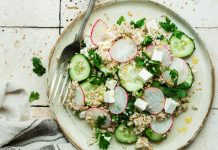
In a study from the National Eye Institute, scientists found that dietary nitrate intake is linked to a lower risk for the progression of age-related macular degeneration (AMD).
AMD is a major cause of blindness worldwide and is the leading cause of vision loss and blindness for Americans aged 65 years and older.
The number of older Americans is projected to nearly double from 48 million to 88 million in 2050. As Mary’s story shows, AMD destroys the sharp, central vision needed to see clearly.
The researchers examined the association between dietary nitrate intake and AMD progression with data from the prospective Age-Related Eye Disease Study (AREDS) and AREDS2 randomized clinical trial cohorts and extended follow-up studies.
Data were included for 7,788 participants in the combined AREDS/AREDS2 cohort, with 13,511 eligible eyes.
The researchers found that dietary nitrate intake was linked to a reduced risk for progression to late AMD. The risks for geographic atrophy (GA) and neovascular AMD (nAMD) were also reduced.
Increased nitrate intake was linked to a reduced risk for late AMD and GA, but not with other eye diseases.
An association was found between the Mediterranean diet and dietary nitrate intake.
The team says much of the effects associated with nitrate intake can be attributed to plant-based dietary patterns in general, such as a Mediterranean diet.
If you care about nutrition, please read studies about how vitamin B may help fight vision loss, and how Mediterranean diet could protect your brain health.
For more information about nutrition, please see recent studies that olive oil may help you live longer, and vitamin D could help lower the risk of autoimmune diseases.
The study was conducted by Geoffrey K. Broadhead et al and published in JAMA Ophthalmology.
Copyright © 2023 Knowridge Science Report. All rights reserved.



